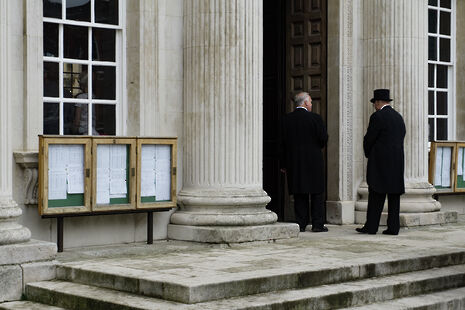University Council approves abolition of Class Lists
Grace submitted by Council means only Regent House approval is now required to end the tradition

Cambridge’s University Council has approved the abolition of the public display of Class Lists, saying that it “no longer benefits the interests of the collegiate University or the various parties within it.”
On July 11th, the Council submitted a ‘Grace’ for approval by the Regent House of the University, which is the last stage in any major decision on issues of University governance, calling for the centuries-old practice to come to an end.
If no objection or amendment is made by at least 25 members of Regent House within ten days of submission, the Grace is deemed to have been approved.
Announcing their decision, which would come into effect from 1 October 2016 if approved, the Council declared that the display of Class Lists “no longer serves the purpose for which it was originally intended, given that students can now access their own results through CamSIS, as can others with a legitimate interest in those results.”
It also noted the fact that, during the consultation process, numerous parties highlighted the “stress” that their publication causes to “many students”, as well as “the various undesirable means to which these public data can be put”.
Currently, lists of names accompanied by degree classes and organised by tripos and part are released on the boards outside Senate House at the end of Easter Term. Cambridge is currently the only university in the UK to publicly display Class Lists, following the abolition of Oxford’s in 2009.
The decision follows last year’s ‘Our Grade, Our Choice’ petition, which received over 1,200 signatures. It called for students to have more say about how and where their examination results are made available. Students can currently opt-out of having their names published if they specify their reasons, an option which the University said had been taken up by approximately 30 students a year.
In April, Varsity revealed that the University was preparing to abolish the practice, after it received the strong backing of the General Board of the Faculties.
Last month, a group of students belatedly launched a petition to “save the class list” – however, debate and a decision on behalf of the student body to oppose their publication already passed CUSU Council in November last year.
It means that the Tompkins Table, produced by former Trinity student Peter Tompkins and published in The Independent, will most likely cease to exist. The General Board’s report earlier this year stated that “classing information would no longer be released to The Independent, and as a result the Tompkins table would cease to be published.”
The Colleges and Faculties will continue to produce their own, internally-circulated Baxter Tables to compare and quantify different Colleges’ results.
 News / Eight Cambridge researchers awarded €17m in ERC research grants27 December 2025
News / Eight Cambridge researchers awarded €17m in ERC research grants27 December 2025 News / Downing investigates ‘mysterious’ underground burial vault 29 December 2025
News / Downing investigates ‘mysterious’ underground burial vault 29 December 2025 Lifestyle / Ask Auntie Alice29 December 2025
Lifestyle / Ask Auntie Alice29 December 2025 Sport / Hard work, heartbreak and hope: international gymnast Maddie Marshall’s journey 29 December 2025
Sport / Hard work, heartbreak and hope: international gymnast Maddie Marshall’s journey 29 December 2025 Interviews / Meet Juan Michel, Cambridge’s multilingual musician29 December 2025
Interviews / Meet Juan Michel, Cambridge’s multilingual musician29 December 2025










